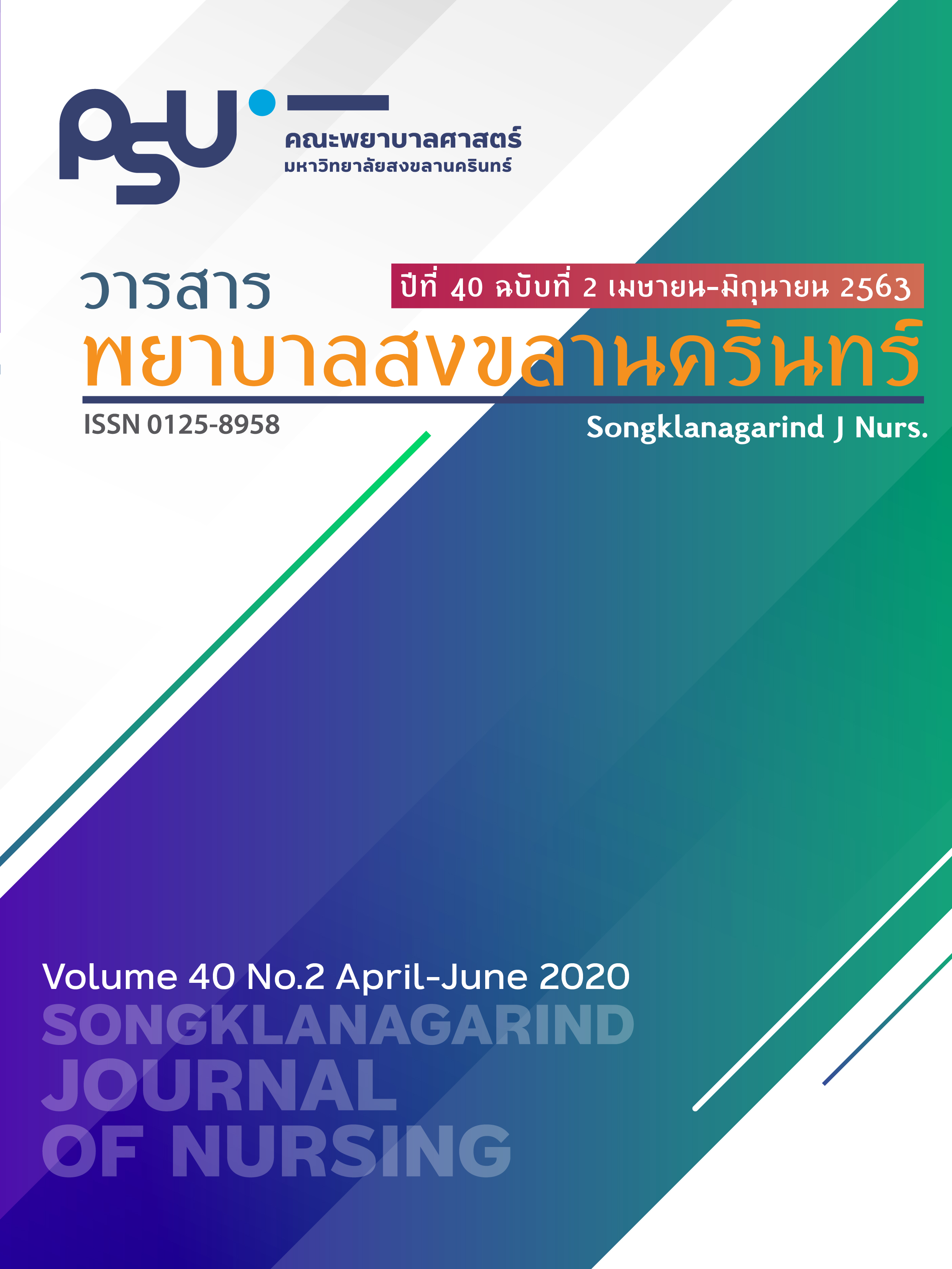Effects of a Palliative Care Education Program on Palliative Care Competencies of Registered Nurses in a Community Hospital in Southern Thailand
Main Article Content
Abstract
This quasi-experimental study was aimed to examine the impact of a palliative care educational program for palliative nursing competencies among registered nurses. Using purposive sampling, 42 participants were recruited. They were divided equally into the intervention group (21 nurses) and the control group (21 nurses). The intervention group received a 5-day palliative care education plus 3 weeks of palliative nursing practice, and the control group received only palliative care education. The study showed that the mean scores of palliative nursing competencies of the intervention group were significantly higher than both the baseline scores (t = 4.70, p < .001) and the scores of the control group (t = 2.27, p < .05). In order to improve palliative care nursing competence, the course must be designed to include not only knowledge based training, but also skill based training.
Article Details
References
Ezer T, Lohman D, de Luca GB. Palliative care and human right: A decade of evolution in standards. J Pain Symptom Manage. 2018; 55(2S): S163-9.
World Health Organization [Internet]. WHO definition of palliative care. [cited 2019 Jul, 7]. Available from: https://www.who.int/cancer/ palliative/definition/en/
Thailand Nursing and Midwifery Council. Training program in palliative nursing. Bangkok, 2015.
Brazil K, Kaasalainen S, McAiney C, et al. Knowledge and perceived competence among nurses caring for the dying in long-term care homes. Int J Palliat Nurs. 2012; 18(2): 77-83.
White KR, Coyne PJ, Patel UB. Are nurses adequately prepared for end-to-life care? J Nurs Scholarsh. 2001 Second; 33(2): 147-51.
Iranmanesh S, Razban F, Tirgari B, et al. Nurses’ knowledge about palliative care in Southeast Iran. Palliat Support Care. 2013; 12(3): 203-10.
Keawtong W, Rawiworakul T, Kalampakorn S, et al. Competencies of palliative care among community nurses in primary care units. JRTAN. 2017; 18(18): 74-83. Thai.
Hanprasitkam K, Patoomwan A, Churaitatsanee S, et al. The effect of an end-of-life care education program on nurses’ knowledge, attitude, and practice in caring for end-of-life patients. Rama Nurs J. 2011; 17(1): 126-40. Thai.
Srisuwan, N. Factors related to nurses’ competency in communication with patients at the end of life and their families [thesis]. Songkhla: Prince of Songkla University, 2013.
Maeroh N. Kongsuwan W. Yodchai K. Barriers in providing palliative care in intensive care units: nurses’ experiences. Songklanagarind J Nurs. 2017; 37(3): 74-116. Thai.
Nupinit W, Nilmanat K, Mutchim, Y. Selective factors related to intensive care units’ registered nurses’ competency in caring for terminally ill patients. TJNC. 2017; 32(4): 94-106. Thai.
Ferrell B, Malloy P, Mazanec P, et al. CARES: AACN’s new competencies and recommendations for educating undergraduate nursing students to improve palliative care. J Prof Nurs. 2016; 32(5): 327-33.
Nilmanat K. Editorial: A way forward for palliative care nursing. Pac Rim Int J Nurs Res Thail. 2019; 23(2): 101-5.
Carr CH, Musselman E. Hospice & palliative care education for advanced practice registered nurses: Are more programs needed?. J Fam ed. 2016; 3(2): 1053.
Pramoj N, Ayuthay P, Monkong S, et al. The effect of a supportive educational end-of-life care program on knowledge and perceived self- efficacy of professional nurse. Rama Nurse J. 2011; 17(1): 141-56. Thai.
Pesut B, Greig M. Resources for educating, training, and mentoring nurses and unregulated nursing care providers in palliative care: A review and expert consultation. J Palliat Med. 2018; 21(s1): S50-6.
Phillips JL, Piza M, Ingham J. Continuing professional development programmes for rural nurses involved in palliative care delivery: An integrative review. Nurse Educ Today. 2012; 32(4): 385-92.
Tyler RW. Basic principles of curriculum and instruction. Curriculum Studies Reader E2: Routledge. 2013; 51-59.
Rule AC. The components of authentic learning. J Authentic Learning. 2006; 1(3): 1-10.
Adriaansen MJM, Van Achterberg T, Borm G. Effects of a postqualification course in palliative care. J Adv Nurs. 2005; 49(1): 96-100.
Cohen J. Statistical power analysis for the behavioral sciences (2 nd ed.). New Jersery: Lawrence Erlbaum Associateds; 1988.
Desbiens J-F, Fillion L. Development of the palliative care nursing self-competence scale. J Hosp Palliat Nurs. 2011; 13(4): 230-41.
Loaknimit V, Junda T, Sumdaengrit B. Self- perceived palliative care competencies of nursing working in a university hospital within less than two years of receiving bachelor’s degree [thesis]. Nakhon Pathom: Mahidol University, 2019.
Spies C, Seale I, Botma Y. Adult learning: What nurse educators need to know about mature students. Curationis. 2015; 38(2): 1494. Published 2015 Nov 20. doi:10.4102/curationis.v38i2.1494
Iucu RB, Marin E. Authentic learning in adult education. Procedia Soc Behav Sci. 2014; 142: 410-5.
Budkaew J. Learning through experiences: Medical students’ reflection on a brief community hospital placement. Srinagarind Med J. 2016; 31(5): 282-9. Thai.
Kusoom W, Tongvichean S. Developing critical thinking skill for nursing students. The Journal of Faculty of Nursing Burapha University. 2017; 25(3): 1-8. Thai.
Kusoom W, Hengyotmakt A. The effects of case-based learning on nursing students’ knowl edge retention. Academic Journal Bangkok thonburi University. 2019; 8(1): 187-196. Thai.
Gillan PC, van der Riet PJ, Jeong S. End of life care education, past and present: A review of the literature. Nurse Educ Today. 2014; 34(3): 331-42.


